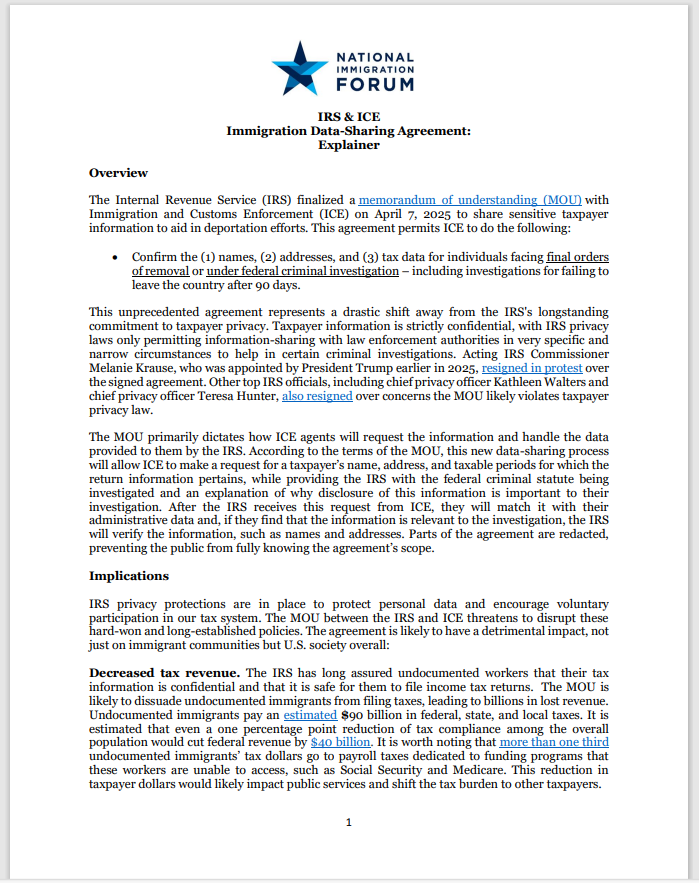Overview

The Internal Revenue Service (IRS) finalized a memorandum of understanding (MOU) with Immigration and Customs Enforcement (ICE) on April 7, 2025 to share sensitive taxpayer information to aid in deportation efforts. This agreement permits ICE to do the following:
- Confirm the (1) names, (2) addresses, and (3) tax data for individuals facing final orders of removal or under federal criminal investigation – including investigations for failing to leave the country after 90 days.
This unprecedented agreement represents a drastic shift away from the IRS’s longstanding commitment to taxpayer privacy. Taxpayer information is strictly confidential, with IRS privacy laws only permitting information-sharing with law enforcement authorities in very specific and narrow circumstances to help in certain criminal investigations. Acting IRS Commissioner Melanie Krause, who was appointed by President Trump earlier in 2025,resigned in protest over the signed agreement. Other top IRS officials, including chief privacy officer Kathleen Walters and chief privacy officer Teresa Hunter, also resigned over concerns the MOU likely violates taxpayer privacy law.
The MOU primarily dictates how ICE agents will request the information and handle the data provided to them by the IRS. According to the terms of the MOU, this new data-sharing process will allow ICE to make a request for a taxpayer’s name, address, and taxable periods for which the return information pertains, while providing the IRS with the federal criminal statute being investigated and an explanation of why disclosure of this information is important to their investigation. After the IRS receives this request from ICE, they will match it with their administrative data and, if they find that the information is relevant to the investigation, the IRS will verify the information, such as names and addresses. Parts of the agreement are redacted, preventing the public from fully knowing the agreement’s scope.
Implications
IRS privacy protections are in place to protect personal data and encourage voluntary participation in our tax system. The MOU between the IRS and ICE threatens to disrupt these hard-won and long-established policies. The agreement is likely to have a detrimental impact, not just on immigrant communities but U.S. society overall:
Decreased tax revenue. The IRS has long assured undocumented workers that their tax information is confidential and that it is safe for them to file income tax returns. The MOU is likely to dissuade undocumented immigrants from filing taxes, leading to billions in lost revenue. Undocumented immigrants pay an estimated $90 billion in federal, state, and local taxes. It is estimated that even a one percentage point reduction of tax compliance among the overall population would cut federal revenue by $40 billion. It is worth noting that more than one third undocumented immigrants’ tax dollars go to payroll taxes dedicated to funding programs that these workers are unable to access, such as Social Security and Medicare. This reduction in taxpayer dollars would likely impact public services and shift the tax burden to other taxpayers.
Mass immigration enforcement. DHS officials suggested in meetings they would ask the IRS for help locating up to seven million undocumented immigrants in the U.S. – not just those with final orders of removal or under criminal investigation. There are about 11 million undocumented immigrants in the United States. Of this group, 79 percent (8.7 million) have lived in the U.S. for more than 15 years, becoming instrumental parts of their communities. These individuals are undocumented, but otherwise law-abiding and contributing to our communities. Such a broad scope would disrupt society, impacting businesses and our workforce.
Undermining taxpayer privacy for everyone. A data-sharing agreement between the IRS and ICE opens the door to the misuse of taxpayer information, which could impact legal residents and U.S. citizens. The MOU sets a dangerous precedent that removes the IRS’ function as a neutral financial authority with strict privacy protections. Taxpayer information could be used to apply pressure on individuals and institutions, or as retribution against such individuals and institutions. The Internal Revenue Code restricts the sharing of taxpayer information, even with other federal agencies, other than narrow exceptions related to certain criminal investigations. The MOU between ICE and the IRS is unprecedented in its broadness and scope, focusing on immigration enforcement, which is usually a civil offense. Additionally, it is possible that because the IRS databases are not designed for immigration enforcement American citizens would also be subject to privacy violations and erroneous immigration actions due to administrative and data mix-ups.
Conclusion
The MOU between the IRS and ICE marks a significant departure from hard-won and long-standing taxpayer privacy protections in the U.S. While the MOU purports to place limits on the scope of data-sharing between the two federal agencies – focusing primarily on individuals with final orders of removal or under criminal investigations – its implications are nonetheless disruptive and serious. The agreement will likely discourage undocumented immigrants from filing federal taxes in the future, could result in broader immigration enforcement data-sharing in subsequent years, and could lead to the misuse of taxpayer information, not just for undocumented immigrants but also for legal residents and U.S. citizens.
.
National Immigration Forum would like to thank Katia Diamond-Sagias, Policy and Advocacy intern, for helping to develop this explainer.


